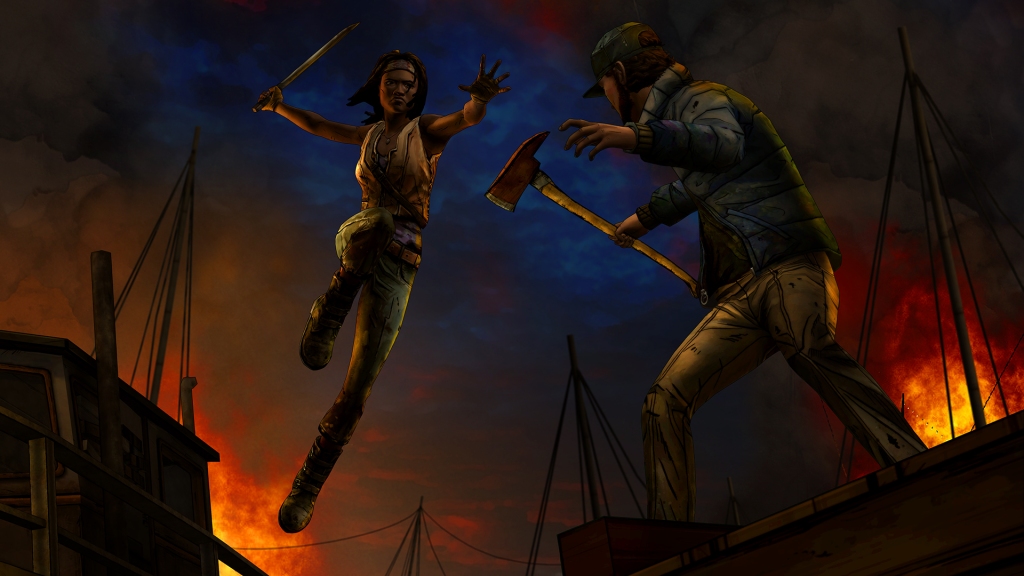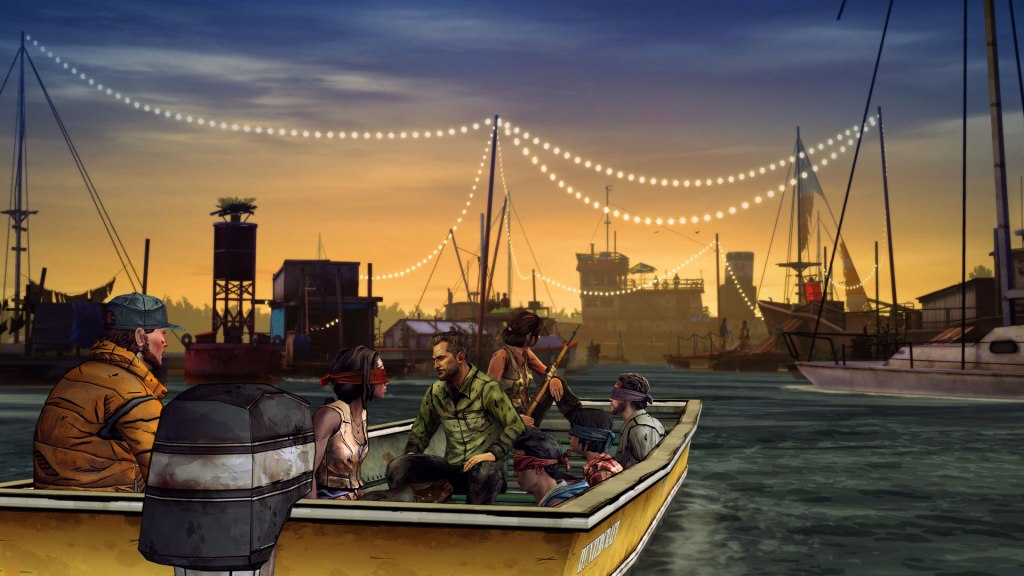
Developer: Telltale Games
Publisher: Telltale Games
Available On: Android, iOS, macOS, PC, PlayStation 3, PlayStation 4, Xbox 360, and Xbox One
Xbox One version reviewed on Xbox Series S
When Telltale Games launched The Walking Dead: Season 1 in 2012, it was like lightning in a bottle. Featuring a landmark gameplay style that combined the thrill of the “choose your own adventure” books from the 1980s-1990s with all of the moral ambiguity of The Walking Dead comics and television show, Telltale’s first foray into the world of the undead was considered a narrative masterpiece and won “Game of the Year” awards from multiple outlets. As a longtime fan of both Telltale Games and The Walking Dead, I’ve loved playing each “season” of this series over the years, but until now I’ve never played The Walking Dead: Michonne, a spin-off featuring one of the most beloved characters from the franchise. While it still contains several of the elements that have made this series of games so memorable, it’s also the hardest one to recommend to anyone besides the most hardcore of fans.
For starters, if your experience with The Walking Dead is limited to just the Telltale Games, you might be at a loss as to who Michonne is. Although there have been a few fun cameos, the Telltale Games focus almost entirely on new characters and have very little crossover with the comics and television show, which is where Michonne originated. This iconic sword-wielding character is known for her ruthless fighting style, her famous introduction involving her “pet” walkers (they never say “zombie” in The Walking Dead), her tragic backstory, and how she becomes an integral member of the main group of characters. While this game does a mostly solid job of introducing you to her and getting you caught up on who she is and the arc she’s on, it also takes place during a mysterious period in the comics where she temporarily leaves the group. For fans of the comics, it’s nice to get some answers as to where she went and what happened to her during this time, but I can’t see it having the same impact for those who have only played the games.
In typical Telltale fashion, Michonne features an episodic structure that divides the game into distinct episodes rather than a single uninterrupted experience. At the time that these kinds of games were originally coming out, the episodes had a schedule of anywhere between a few weeks or a few months for the next installment, and most people I know (myself included) would just wait for the entire season to wrap up before diving in. Thankfully, the wait was shorter with Michonne since it only had 3 episodes compared to the main seasons and their 5, but since the whole thing is wrapped up now, I guess it doesn’t really make sense to talk about the wait time between episodes, does it? It is, however, worth noting that while the overall number of episodes is shorter than the main seasons, each episode is also half the length, with it only taking about an hour per episode here than the two-hour length of the episodes in the main seasons. That’s not necessarily a bad thing, but as someone who has also played all of the other seasons, it was shocking to see how fast I was getting through these episodes.

As previously mentioned, this game fills in a gap in the comics where Michonne temporarily leaves the main group. When this story picks up, Michonne is rescued from a legion of walkers by a man named Pete who brings her to his group of survivors and the boat they call home. Michonne becomes the newest member of the group and spends a few weeks out on the water with them until a search and rescue mission has them crossing paths with a larger boating community called Monroe. As misunderstandings turn into interrogation and torture, Michonne and her new friends have to find a way to escape the crosshairs of Monroe’s fearsome leader, Norma, and her psychotic brother, Randall. For the most part, this is a fairly straightforward story about two clashing groups of people and the fallout that comes from their interactions with each other. Norma is a force to be reckoned with, but Randall’s insatiable lust for violence and revenge makes him a great antagonist, and the way he tries to play with Michonne’s mind and sew doubt is riveting.
Unfortunately, compared to the full seasons, there’s significantly less gameplay in Michonne. Where the seasons do a good job of breaking up conversations and combat with exploration and light puzzles, there’s almost none of that here. The vast majority of this game is spent selecting dialogue options and doing quick-time events for killing walkers and humans, with virtually nothing else to see or do. Whenever the game does try to give you a moment to catch your breath, you’re only given a minute or two to walk around and explore a tiny area. I know that having to make hard decisions and live with their repercussions is the major draw of a Telltale Game, but as someone who played just about every game this studio has released, I found Michonne to have the least amount of interaction and variety in its content.
However, I’m willing to let some of that slide because the decisions you’re forced to make in this game are among the most complex in the studio’s history. Telltale has always excelled at making you grapple with your decisions and put actual thought into the things you choose to say and do to other characters, but while playing Michonne I was constantly second-guessing my choices and fearing their outcomes. One of the most notable decisions these games let you make is deciding who lives and dies, and while you always have a basic idea as to where your choices are leading you, it’s not uncommon to have what seems like a good idea at the moment lead to heartbreak further down the road. In Michonne, there are dozens of decisions that don’t always play out as you would expect, and what I found so impressive was that even when what seemed like the “right” decision ended up having a catastrophic outcome, I always felt like it made sense in hindsight and didn’t feel the need to save scum for a satisfying story. There are literally characters in this game that I don’t actually know if you can save, and while I would obviously have loved to keep as many of the “good guys” alive as possible, the weight and finality of losing characters makes everything feel high stakes and emotional.

I wish I could say that combat hit with all of the impact of your choices, but it’s once again the weakest part of the Telltale experience. If this is your first Telltale game, then the way combat is performed may come as a shock. In Michonne (and every other Telltale game), combat is played out by flashing a button or direction on the screen and then giving you just a few quick seconds to hit the corresponding button or press the movement stick/key in the direction shown to attack or dodge enemies. It’s simple, but arguably the least engaging way of handling combat, especially with a character like Michonne who is known for her weapon proficiency. Combat is so simple and void of challenge that you never fear messing up and having to pay for it, which makes every encounter with walkers and members of Monroe feel like nothing more than a distraction that keeps you from the good parts. While this is old news by now, Telltale has gone through a rough period of shutting down and then reforming as a studio, and while they haven’t done much since (they re-released their first Batman game with a new “Shadow Mode” filter), I really hope whatever they do next makes some drastic changes to their combat system to make their games more mechanically engaging.
One of the most unfortunate things about playing this game so many years after its release is that when Telltale Games was shut down the servers that kept track of your choices and compared them to the rest of the player base were taken offline. This was always one of my favorite parts of these games, and finishing an episode and seeing detailed stat pages of which percentage of players made which decisions was an eye-opening experience that actually taught me a lot about how I play games compared to others. Not having that for Michonne is super disappointing, and while I imagine it’s too old for them to patch with updated servers, I can’t help but feel like a significant aspect of the game is missing. For most, this won’t be an issue, but as a longtime fan of these games having such an informative and unique feature no longer functional is a huge letdown.
On a final note, this game is victim to all of the same kinds of technical bugs that plagued every Telltale Games release. Background music and sound effects occasionally clip in and out, character models sometimes disappear for a second when the camera cuts to a different angle, and the frame rate during combat sections dips significantly. While I’m not excusing these shortcomings, as someone who experienced these exact same issues on every Telltale Game I’ve played, I didn’t find them surprising. Despite being loved by many, these games have always felt like they needed a revamped game engine, and now that Telltale is back and looking to make more games, I’m hoping these will stay as problems of the past.

FINAL VERDICT
Despite being a fan of Telltale Games and The Walking Dead, it’s hard to recommend The Walking Dead: Michonne. While its smaller size compared to the more popular main seasons makes it easy to commit to finishing, the lack of exploration and light puzzles found in other games in the series makes it feel like a lesser project. The difficult decision-making that’s served as the calling card of Telltale Games is still on display here, and while the choices you make are genuinely tough and have satisfying and surprising outcomes, Michonne doesn’t quite have the same impact as the larger seasons. If you enjoy Telltale or The Walking Dead then you’ll probably find some enjoyment here, but the poor combat, lack of variety, slew of technical issues, and complete removal of the stat system are all serious knocks against it that make it hard to recommend to any but the most die-hard of fans.
– Zack Burrows
